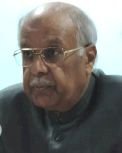Spotlight West Asia
Looking West: Bridging the Gulf with the GCC
02 Jun, 2014 · 4483
Amb Ranjit Gupta weighs in on the strategic importance of the GCC countries to India
For a potential global power like India clearly relations with China and the US are exceedingly important. Relations with Japan have acquired great strategic significance. Israel is a very valuable defence and high technology partner and the relationship deserves high priority cultivation. Russia and the EU will remain important partners. Africa and ASEAN countries have their respective intrinsic importance. The new government has already exhibited phenomenal foresight in inviting the heads of State or government of SAARC countries to the Prime Minister’s swearing in ceremony, thereby emphasising the primary importance of the immediate neighbourhood.
The media and think-tanks have been busy making recommendations. However, no mention has been made at all of the absolutely enormous strategic importance of the six GCC countries – Bahrain, Kuwait, Oman, Qatar, Saudi Arabia and the UAE - to India. In fact, if the baskets of strategic interests that India has vis-à-vis different regions of the world are compared, the GCC countries would be near the top of any theoretical hierarchy, ranking different regions from the perspective of India’s national well-being and national interests for the immediate future. This region is also the heartland of Islam. The Western media and even many governments have deliberately projected a negative image of the new Prime Minister as being anti-Muslim. This falsity must be contested. This further underlines the importance of the relationship with the GCC countries. The Islamic dimension has acquired strategic significance from an altogether different context also arising from violence associated with Islamic extremism. Therefore, there can be no two views that India needs to have the best possible relations with the GCC countries; this is of the highest strategic importance. Every country has a list of priorities and clearly for India nurturing this relationship must rank amongst the very top. This is substantiated in the following paragraphs.
For India to become a global power it must grow at 8-10 per cent annually for the next three-four decades. The assured availability of adequate energy resources will be the key factor. Two-thirds of India’s total oil imports are from the Gulf region, with half of the total being from the GCC countries. Despite having a special relationship with Pakistan, none of the GCC countries ever stopped oil exports to India or even threatened to do so through the different Indo-Pakistani wars. They voluntarily stepped in to make up the shortfalls whenever supplies were temporarily disrupted, eg in 1990-91 and in 2003. Saudi Arabia is the largest supplier of oil and Qatar the largest supplier of gas to India.
India’s total trade with the GCC countries in 2012-13 at US$159.14 billion made them India’s largest regional trading bloc by far. This has been India’s fastest growing trade relationship. The UAE is India’s largest trading partner – just India’s exports to the UAE are more than India’s total trade with each of the countries of the world except with China, the US and Saudi Arabia; Saudi Arabia is India’s fourth largest trading partner and also the largest supplier of oil to India – just India’s exports to Saudi Arabia are more than India’s total trade with such important countries such as France, Thailand, Italy, Russia, Israel, etc.
The GCC countries are home to more than seven million Indian passport holders. They are the source of very substantial inward remittances, totaling about US$30-35 billion last year. For a democracy, the domestic political implications of the safety and welfare of such a huge Indian passport-holding community being located abroad in a cohesive politico-geographical but a potentially volatile area, is, by itself standalone, an extremely important factor.
Despite Pakistan’s strenuous efforts, anti-terrorism cooperation from Saudi Arabia and the UAE has been particularly noteworthy. Both these countries have made combating violent Islamic extremism a priority policy objective.
Some GCC countries have absolutely huge Sovereign Wealth Funds, some of which they wish to invest in India – but India needs to create an investment friendly environment which the new government is already committed to doing.
It merits mention that in the overall process, the potential hurdle of the special relationship that has existed between the GCC countries and Pakistan, particularly between Saudi Arabia and the UAE and Pakistan, has been skillfully bypassed. Neither has India’s close defence relationship with Israel been a hurdle.
It is possible to create virtually irrevocable symbiotic strategic bonds with the GCC countries by India contributing to providing food security for the GCC countries - a preeminent strategic priority for them. GCC countries, flush with funds, could get strategically involved through large scale investment in India’s agri-food economy. In return, India would benefit enormously in the food sector too apart from ensuring its energy security. A detailed proposal has been submitted to the Ministry of External Affairs.
When relations are excellent, there is an understandable tendency on the part of the political leadership to take the relationship for granted. The new government can ill-afford to do so. No Prime Ministerial visit to the UAE has taken place since 1982. This glaring lacuna must be set right in 2014. It is important that there should be a bilateral meeting with the Saudi King or head of delegation at the annual G20 meetings on a regular basis.


